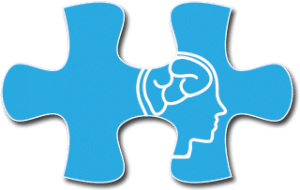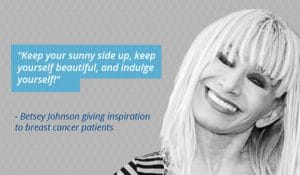Mind and cancer. How you think can help you heal and recover.
Mind and cancer: our mind is a powerful tool that we can manipulate, but sometimes it can also manipulate us. Our mind can help us master stress or in fact, it can inflame stress, particularly if your thoughts are negative and you worry. If you or your family member has recently been diagnosed with cancer, it is likely you will be in a very high stress state as a result.
Cancer and how you think are linked
If you are like most people ‘Google’ ‘cancer diagnosis’ once you receive the news, you are likely to be overwhelmed. Articles can be technical, jargon-filled or non-specific that really don’t help much at all and can often cause worry.
In my experience with individual coaching the majority of challenges people like you have have stem from feeling overwhelmed with life. Other factors include lacking confidence, negativity about aspects of life, and expecting too much of yourself and others.
Many things trigger stress including your health and the new diagnosis, emotions, finances, family, work, friends and social environment, decisions, and change.
Steps to help manage stress
- Step 1: to recognise your stress triggers, and
- Step 2: to develop healthy habits to minimise and reduce your stress, as this journey you are on is going to be a challenge and is often long.
If you can’t do this you may develop unhealthy habits (e.g. addictions, compulsions) and anxieties, fears, and thoughts that limit your enjoyment of life. Physically if you maintain levels of stress that are too high for extended periods you can end up with a physical breakdown.
If you’re not practicing healthy habits you may need to find some assistance to do so, coaching, counselling and peer-support are proven methods to reduce stress if you can’t do it all by yourself.
Summary of the stages of the downward spiral after a cancer diagnosis
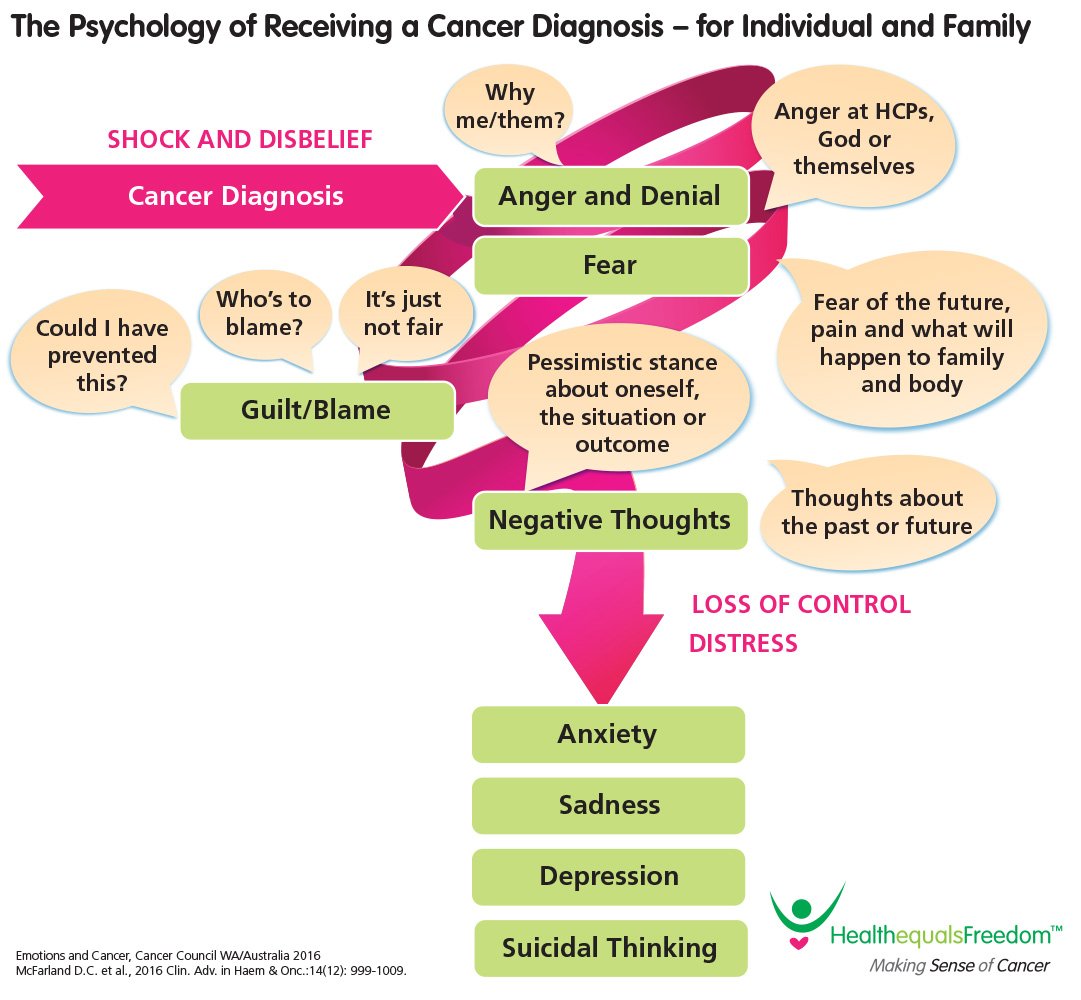
Whereas with help we can reframe where you are to a more positive place
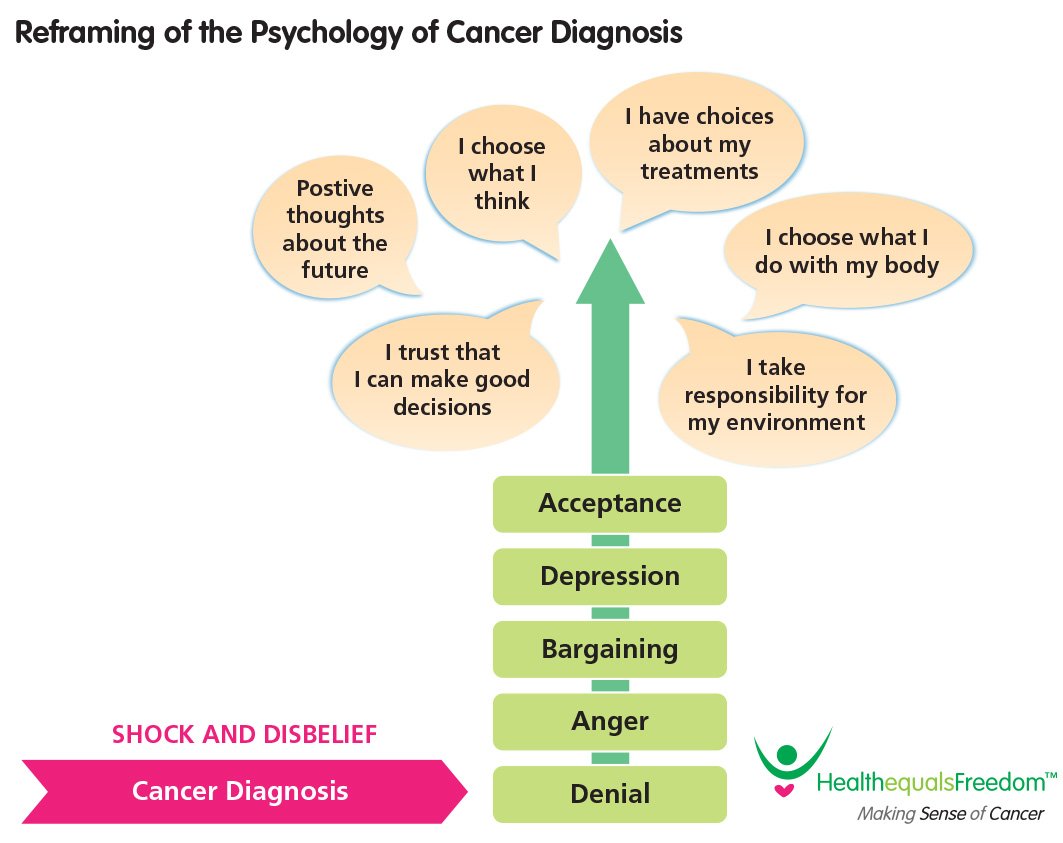
In fact, if you talk to cancer survivors and thrivers (e.g. Olivia Newton-John) you will notice that their language, actions, and behaviours are positive and empowered. You have the ability to take control of how you think, here is some inspiration for you!
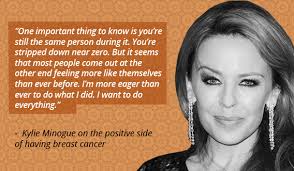
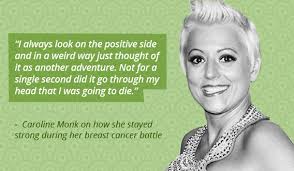
Neuroplasticity
The good thing is that research has shown that the adult brain is plastic, or in other words, you can change it. We can actually retrain our thoughts and create new ways of thinking.
The old theory was that we could not change our brain; it was very fixed.
Neuroplasticity research has encouragingly shown that we can ‘teach old dogs’ new tricks’! There is a well-researched ‘App’ known as Lumosity App, which has a series of games and puzzles, shown to improve memory and problem-solving among others. In fact, I recommend ‘Lumosity’ for you, your family and your children if you have them, as it is never too late to change the way you think. Lumosity is based on research that has been shown to have a range of benefits; even retraining very injured brains (e.g. after surgery etc).
BrainHQ has also been found to improve how cancer survivors perceive their memory.

The science of cognitive training seeks to help us understand how the brain can change
In 2020 alone, 33 cognitive training studies were registered on the global government database of clinical trials www.ClinicalTrials.gov. Lumosity scientists and their collaborators published 7 peer-reviewed studies using Lumosity as a cognitive training tool for cancer survivors, healthy adults, the elderly and children with a genetic disorder.
I have a challenge for you – put everywhere you can think of, screen saver, mirror in the bathroom, on the shower screen — see if it shifts your thinking?
“I AM ENOUGH“, try it out for one week and notice how you feel.
Meditation
Meditation is a practice or mental focus to realise benefits or as an end in itself.
Deepak Chopra describes meditation as ‘not a way of making your mind quiet but a way of entering into a quiet already there.’
The average person thinks about 50,000 thoughts every day. Meditation has been used for centuries by Eastern cultures and nowadays is a widely accepted relaxation technique. Some sports and exercises use it as part of the program e.g. Yoga, martial arts (e.g. Karate, Taekwondo, Kendo, etc) and some spiritual and relaxation programs use meditation. The goal of all meditation sports/spiritual/religious or therapeutic practice is to quieten the mind. Meditation can benefit you as much as you can manage, ideally daily would be best and some people practice at the start and at the end of the day. When you have cancer, it can quieten your stressed, busy mind.
Have a go with a Mini-Meditation – for your mind and cancer
If you have any trouble meditating or getting your mind off your stresses I recommend that you get an App to help you such as CALM, as this can help distract your busy mind until it relaxes.
I have created a guided meditation to you as my gift – this can get you started if you have not meditated before. Just listen to my voice and use this as a gateway to meditation practice. I guide getting you to use the power of your imagination to direct your mind into a relaxed state.
The benefits of meditation:
There have been multiple studies on the minds of Buddhist monks, who regularly meditate, which have shown that they have increased activity in the areas of the brain associated with happiness, compared to those who do not meditate regularly. Monks meditate for many hours per day, which may not be practical for you. However, when you are waiting at appointments or treatment centres even small amounts of meditation are known to have benefits in terms of concentration, reduced stress, and ratings of higher enjoyment of life. Studies have shown that meditation can benefit the heart and can reduce blood pressure and improve calmness and happiness.
Yoga Teacher and expert in meditation practice, Jean-Alain d’Argent, from Dharma Health Centre Facebook page, offers a daily online yoga class at 8 am Melbourne, Australian time, and he provides a daily meditation at 9pm, on Facebook live if you would like to join him.
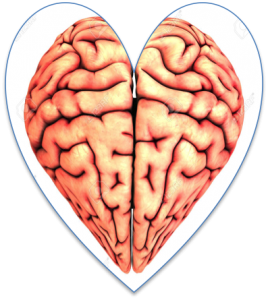
Mindfulness
Yesterday is History. Tomorrow is a mystery. Today is a gift. That’s why it’s called the present!
Mindfulness has gained more ‘awareness’ and popularity in recent times. The state of mindfulness is being in present time consciousness. Your attitude can point your mind in a direction. Focussing your mind and cancer recovery are linked.
What lies behind us, and what lies before us, are tiny matters compared to what lies within us – Ralph Waldo Emerson.
Mindfulness allows you to enjoy your experiences of life to the fullest extent. Research has shown practicing mindfulness can improve your general wellbeing. There are some handy Apps you might like to try including Headspace, Smiling Mind, and Insight Timer.
Difference between Empathy & Sympathy
When you have been newly diagnosed, your friends and family often don’t know what to say to you. This little video might be one you can share with them to help them feel more comfortable talking to you and to understand it is hard for you and them.
Professor Brené Brown in this little video reminds us that we can only create a genuine empathic connection if we are brave enough to really get in touch with our own fragilities, which may help your friends and family help you.
Professor Brené Brown on Empathy vs Sympathy

Contact Us for a personal discussion.
Life is short, enjoy your life in the positive!
Yours in good health,

